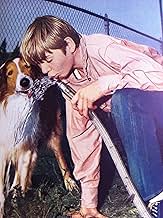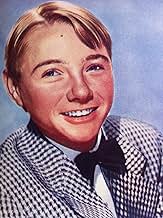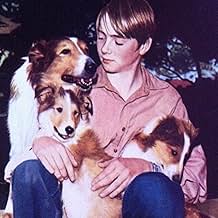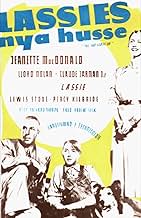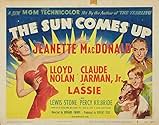AVALIAÇÃO DA IMDb
6,4/10
493
SUA AVALIAÇÃO
Adicionar um enredo no seu idiomaSet in the rural south of the United States, a bereaved war widow learns to to put aside her bitterness and grief as she grows to love a young orphan boy and the dog that belonged to her lat... Ler tudoSet in the rural south of the United States, a bereaved war widow learns to to put aside her bitterness and grief as she grows to love a young orphan boy and the dog that belonged to her late son. Punctuated with song-filled interludes.Set in the rural south of the United States, a bereaved war widow learns to to put aside her bitterness and grief as she grows to love a young orphan boy and the dog that belonged to her late son. Punctuated with song-filled interludes.
- Direção
- Roteiristas
- Artistas
Ed Agresti
- Musician
- (não creditado)
Jessie Arnold
- Townswoman at Fire
- (não creditado)
Charles Bates
- Orphan
- (não creditado)
Bobby Beyers
- Orphan
- (não creditado)
Barbara Billingsley
- Nurse
- (não creditado)
Paul E. Burns
- Dr. Sample
- (não creditado)
John Butler
- Hotel Attendant
- (não creditado)
Avaliações em destaque
Even if you don't like Jeanette McDonald, and even if you don't like child actors, and even if you don't like Lassie, do yourself a favor and rent The Sun Comes Up just to listen to the main theme during the opening credits. André Previn earned a well-deserved Rag nomination for his first film composition. It's such a beautiful, layered theme that sounds exactly as it's supposed to. It sounds like a sunrise, the promise of a brighter future, and a deep inhalation after years of shallow breathing.
If you want to watch more than the opening credits, you'll get to see Jeanette McDonald in a drama where she barely sings. She starts the movie off as a successful performer, but when her young son is accidentally killed, she tells her manager, Lewis Stone, that she's going to retire and retreat into the country. She packs up her car and her grief and drives to a small mountain town where she can hopefully start over. What she doesn't yet realize is that in a small town, no one leaves you alone! The owner of the one general store, Percy Kilbride, is extremely nosy, a confusing Margaret Hamilton wants to be her friend, and the young errand boy, Claude Jarman Jr., who grows attached to her dog doesn't let her harden her heart as she'd intended.
I didn't really know what to expect out of this movie, but it was pretty enjoyable. My favorite scene was when Jeanette leaves for the countryside. She's left her son's dog, Lassie, behind because it would be too painful to continue to live with her and show her affection; her son was hit by a car while trying to get Lassie out of the middle of the road. But Lassie's lonely and confused too, and it might be some sort of comfort to love who her son loved. Jeanette's very conflicted, and it's a really powerful scene.
I kept waiting for Lloyd Nolan to show up, since he got such a high billing, but he's hardly in the movie. Instead of a romance where a mother can only move on from her tragedy by falling in love, Jeanette grows in other ways. Give this one a shot if it sounds interesting. It gets a bit corny in some parts, but keep in mind it is a Lassie movie. It's supposed to be a little corny.
If you want to watch more than the opening credits, you'll get to see Jeanette McDonald in a drama where she barely sings. She starts the movie off as a successful performer, but when her young son is accidentally killed, she tells her manager, Lewis Stone, that she's going to retire and retreat into the country. She packs up her car and her grief and drives to a small mountain town where she can hopefully start over. What she doesn't yet realize is that in a small town, no one leaves you alone! The owner of the one general store, Percy Kilbride, is extremely nosy, a confusing Margaret Hamilton wants to be her friend, and the young errand boy, Claude Jarman Jr., who grows attached to her dog doesn't let her harden her heart as she'd intended.
I didn't really know what to expect out of this movie, but it was pretty enjoyable. My favorite scene was when Jeanette leaves for the countryside. She's left her son's dog, Lassie, behind because it would be too painful to continue to live with her and show her affection; her son was hit by a car while trying to get Lassie out of the middle of the road. But Lassie's lonely and confused too, and it might be some sort of comfort to love who her son loved. Jeanette's very conflicted, and it's a really powerful scene.
I kept waiting for Lloyd Nolan to show up, since he got such a high billing, but he's hardly in the movie. Instead of a romance where a mother can only move on from her tragedy by falling in love, Jeanette grows in other ways. Give this one a shot if it sounds interesting. It gets a bit corny in some parts, but keep in mind it is a Lassie movie. It's supposed to be a little corny.
Yes, I know.
I'd never seen it - it was MacDonald's last film - what better way for MGM to say you are a has- been than to make her a "mother" in a Lassie movie. Drek! I prepared to "endure it" for Jeannette's sake.
I was utterly captivated. What a lovely movie - classed up there with Friendly Persuasion in terms of truly loving, and truly honest human emotion. I keep trying to convince myself to pass this along, but I cry too much, it's too real, too human, too GOOD for that. For the lovers of what President Wilson tried to do for the US and what Obama in his footsteps is still unable to do for us, this is what the ideal of the US is as it lives on in ideals, honesty, and right thinking and feeling.
Jeannette has four classical aria/song moments - a French song, a repetition of Puccini's Un Bel Di (Broadway Serenade), Songs My Mother Taught Me, and Romance. Not much to go on, but it doesn't matter. She is fine dramatically, as a war widow , whose son dies and is left alone, but is brought to life by her encounter with an orphan {exceptional performance by young actor, Claude Jarman, Jr.] Her son exits at 10 minutes into the film, young Jarman arrives at 20 minutes.
Lewis Stone is seen briefly as an adviser. Percy Kilbridge is brilliant in a Charles Butterworth role as the local sage. Margaret Hamilton is unforgettable as a fashion-conscious spinster. Poor Lloyd Nolan doesn't arrive until an hour and 3 minutes in, but we know he will anchor the film, as he always did {most successfully in Peyton Place).
Oh, do see it - that dog will melt you as will the story and the deft acting, direction and over-all good intentions of it.
I'd never seen it - it was MacDonald's last film - what better way for MGM to say you are a has- been than to make her a "mother" in a Lassie movie. Drek! I prepared to "endure it" for Jeannette's sake.
I was utterly captivated. What a lovely movie - classed up there with Friendly Persuasion in terms of truly loving, and truly honest human emotion. I keep trying to convince myself to pass this along, but I cry too much, it's too real, too human, too GOOD for that. For the lovers of what President Wilson tried to do for the US and what Obama in his footsteps is still unable to do for us, this is what the ideal of the US is as it lives on in ideals, honesty, and right thinking and feeling.
Jeannette has four classical aria/song moments - a French song, a repetition of Puccini's Un Bel Di (Broadway Serenade), Songs My Mother Taught Me, and Romance. Not much to go on, but it doesn't matter. She is fine dramatically, as a war widow , whose son dies and is left alone, but is brought to life by her encounter with an orphan {exceptional performance by young actor, Claude Jarman, Jr.] Her son exits at 10 minutes into the film, young Jarman arrives at 20 minutes.
Lewis Stone is seen briefly as an adviser. Percy Kilbridge is brilliant in a Charles Butterworth role as the local sage. Margaret Hamilton is unforgettable as a fashion-conscious spinster. Poor Lloyd Nolan doesn't arrive until an hour and 3 minutes in, but we know he will anchor the film, as he always did {most successfully in Peyton Place).
Oh, do see it - that dog will melt you as will the story and the deft acting, direction and over-all good intentions of it.
Though she didn't intend The Sun Comes Up to be her final film, it turned out that way for Jeanette MacDonald. In this movie she plays, what else, a concert singer who is a war widow. After a few years of devoting herself to raising her only son, Dwayne Hickman, MacDonald is encouraged by her manager Lewis Stone to go back to the concert stage.
She goes back and becomes a great success in her comeback. But after the concert she sees her son run down by a truck as he was trying to save their collie Lassie from the same fate.
That just about destroys her and who could blame her for wanting to get away from it all. She rents an unused house deep in the Appalachians in North Carolina that's owned by Lloyd Nolan. She and Lassie go to live there and get involved with a group of kids from the county orphanage. Especially one young man, Claude Jarman, Jr., who reminds her of her late son.
Jeanette gets some good opera and concert material to sing, items that were staples in her real concerts. The highlights for me are Un Bel Di from Madame Butterfly and Romance.
And she gets her most cooperative co-star ever in Lassie. The beloved collie pulls off quite a rescue in the climax, but didn't steal any scenes from Jeanette MacDonald.
She never planned that The Sun Comes Up would be her last film. She had a lot of ambitions to return to the screen. During the Fifties she did The King and I in summer stock and hoped to be cast in the film adaption as Anna Leonowens. I think the part would have suited her perfectly and she wouldn't have to have been dubbed as Deborah Kerr was.
And one part she really wanted was as the Mother Abbess in The Sound of Music. She loved the song Climb Every Mountain. But by the time the film version of Sound of Music was being cast, Jeanette's health was failing.
Still The Sun Comes Up is a fine family film and a fitting end for a screen legend.
She goes back and becomes a great success in her comeback. But after the concert she sees her son run down by a truck as he was trying to save their collie Lassie from the same fate.
That just about destroys her and who could blame her for wanting to get away from it all. She rents an unused house deep in the Appalachians in North Carolina that's owned by Lloyd Nolan. She and Lassie go to live there and get involved with a group of kids from the county orphanage. Especially one young man, Claude Jarman, Jr., who reminds her of her late son.
Jeanette gets some good opera and concert material to sing, items that were staples in her real concerts. The highlights for me are Un Bel Di from Madame Butterfly and Romance.
And she gets her most cooperative co-star ever in Lassie. The beloved collie pulls off quite a rescue in the climax, but didn't steal any scenes from Jeanette MacDonald.
She never planned that The Sun Comes Up would be her last film. She had a lot of ambitions to return to the screen. During the Fifties she did The King and I in summer stock and hoped to be cast in the film adaption as Anna Leonowens. I think the part would have suited her perfectly and she wouldn't have to have been dubbed as Deborah Kerr was.
And one part she really wanted was as the Mother Abbess in The Sound of Music. She loved the song Climb Every Mountain. But by the time the film version of Sound of Music was being cast, Jeanette's health was failing.
Still The Sun Comes Up is a fine family film and a fitting end for a screen legend.
This film was Jeanette MacDonald's last film. And, considering it's a nice little family movie, she went out in style.
Helen is distraught. Her son has just died and she has decided to retreat to the countryside to try to forget. This is made tougher because the boy's dog refuses to leave her and she reluctantly takes the dog along with her. Through the course of the movie, Helen becomes friends with an orphan boy, Jerry (Claude Jarmin Jr.) and the woman who wants to be alone and forget soon learns to live again.
This film is less a Lassie film than most. Sure, the dog's important to the story...but the humans are more important and he's more a supporting player. Overall, very engaging and a nice story that you are sure to enjoy....and made with the usual MGM style and flair.
Helen is distraught. Her son has just died and she has decided to retreat to the countryside to try to forget. This is made tougher because the boy's dog refuses to leave her and she reluctantly takes the dog along with her. Through the course of the movie, Helen becomes friends with an orphan boy, Jerry (Claude Jarmin Jr.) and the woman who wants to be alone and forget soon learns to live again.
This film is less a Lassie film than most. Sure, the dog's important to the story...but the humans are more important and he's more a supporting player. Overall, very engaging and a nice story that you are sure to enjoy....and made with the usual MGM style and flair.
Nice, simple family film, a bit dated but still with enough charm and humor to make it agreeable--based on a novel by Marjorie Kinnan Rawlings, author of 'The Yearling'. Jeanette has her bitterness melted by Claude Jarman, Jr. and Lassie when she decides to retreat to the country to forget about the death of her son. An above-average Lassie film with a rather predictable ending after a tense fire sequence in which he rescues Claude Jarman, Jr. from a burning loft. A few nice songs by Jeanette, beautiful settings and some amusing performances by Percy Kilbride, Margaret Hamilton and others. Lloyd Nolan turns up for a cameo role. Pleasant entertainment. The blurb on the VHS copy I have cites a quote from the N.Y. Times which is so accurate: "Simple and sweet...Jeanette MacDonald has never looked lovelier."
Você sabia?
- CuriosidadesSol da Manhã (1949) is mainly based on the 1936 short story "A Mother in Mannville" by Marjorie Kinnan Rawlings. According to the University of South Carolina Libraries description of Rawlings' works, in 1946 MGM asked Rawlings to do a story that could star Lassie with Claude Jarman Jr.. Rawlings started with her 1936 short story "A Mother in Mannville." MGM bought the rights to Rawlings' unpublished story "A Family for Jock," re-titled it "Mountain Prelude," and sold the literary rights to The Saturday Evening Post. The story appeared The Post as a six-part serial during April 26 to May 31, 1947. But it has never been published in novel form.
- Erros de gravaçãoWhen Jerry finally decides to go play with Lassie, we can hear someone off-screen give Lassie a command. Right after Jerry says,"Let's have fun now," and hugs Lassie, a man's voice clearly speaks a word off-camera, and Lassie looks in that direction before running off with the boy.
- Trilhas sonorasUn Bel Di
(uncredited)
from "Madama Butterfly"
Music by Giacomo Puccini
Libretto by Luigi Illica and Giuseppe Giacosa
Sung by Jeanette MacDonald
Principais escolhas
Faça login para avaliar e ver a lista de recomendações personalizadas
Detalhes
- Data de lançamento
- País de origem
- Idioma
- Também conhecido como
- The Sun Comes Up
- Locações de filme
- Empresa de produção
- Consulte mais créditos da empresa na IMDbPro
- Tempo de duração
- 1 h 33 min(93 min)
- Proporção
- 1.37 : 1
Contribua para esta página
Sugerir uma alteração ou adicionar conteúdo ausente


